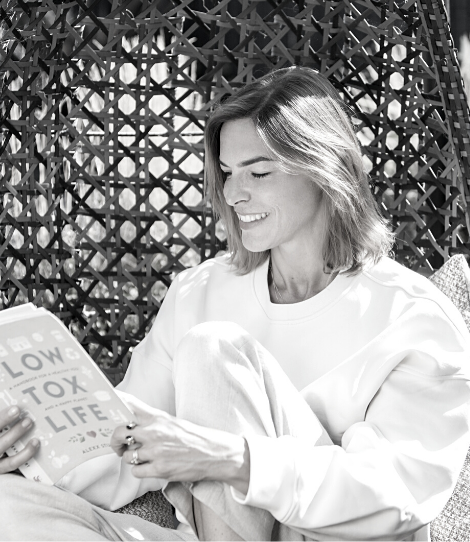At first glance, my life in my mid 40s looked great. Beautiful home, great kids, lots of travel – all the things someone like me is supposed to want. But scratch the surface and you would see that I was a woman at war with my body, and to some degree with my soul.
I got married because I craved security
My first false start had come in my early 30s, I’d worked hard to secure a great corporate career, but the spectre of what I later realised was imposter syndrome had got the better of me. Although my career had been far from a failure, I always felt like one. I was exhausted and when a safe-seeming, high-earning man offered to make it all go away, I gave in and gave up. I didn’t know it at the time, but I think unconsciously, my marriage was as much about a craving for security as much as anything else.
But my determination and perfectionism didn’t just evaporate the day I got married. Instead, I threw myself wholeheartedly into being the best wife and mother I could imagine. I hosted endless playdates and dinner parties and ironed things that had no business being ironed. I cooked constantly, but obsessed with staying slim. And when I couldn’t meet my own or my husband’s frankly Victorian standards, the sense of failure was at least familiar.
Different verse, same as the first
Because it turns out, the same old stuff just comes up in new ways. My frustration grew. I rebelled, and misbehaved at dinner parties. I remember being kicked under the table for having opinions, and on one occasion, I was literally told to ‘get back in my box’. In some ways I feel sorry for my ex-husband. Because I was breaking our unspoken deal: He was supposed to pay the mortgage, and I was supposed to be sweet and nice.
I tried to bury and run from unhappiness
Even as I kicked off over a bottle of Merlot, it still didn’t occur to me to that I was unhappy, and that my marriage was a place I could not continue to be. My whole life had been an investment in success, and a failed marriage wasn’t something I was ready to face.
The problem is that left unchecked, unhappiness becomes misery, and you can’t suppress misery forever.
I decided that location was our problem, and lobbied hard for a move to France. People said I was brave, but for me I was so desperate for freedom, joy, excitement, I could not wait to make the move. I would go ahead with the children and their father would follow. Only he never did.
How I began to change
To be fair, I imagine his reluctance had as much to do with what he found on arrival as his work commitments at home. Because I had gone from doing my best impression of a prim country wife who occasionally lost her cool, to a gregarious, confident woman, who mucked around with her kids and sang at the top of her voice in the car. A new me was blossoming, and I was getting a distinct sense that she was not what he had ordered.
I resented his visits more and more, but I just didn’t want to think about what that might mean. But when we took a trip to the Caribbean to celebrate a friend’s birthday, two things happened that cracked the whole pretence wide open.
The turning point in my marriage
Neither of these things will sound worthy of ending a 15-year marriage, but believe me, they were. The first was that, entirely out of the blue, I felt an intense attraction to another man in the group. It was pretty clear he felt the same too. Nothing happened, but the connection made me feel alive and seen for the first time in a long time. And very, very sad about the prospect of never feeling like that again.
Then, towards the end of the trip, my husband said something that filled me with horror. He commented on how much he was looking forward to our retirement, saying we could go away on a boat, just the two of us. I honestly thought I would throw up or cry. The wave of despair shocked me to my core. One moment I was in a marriage that would last forever, and the next, I knew with absolute certainty that I didn’t love my husband anymore and that there was no return. It was singularly the most terrifying realisation I have known in my life.
We got divorced; it was a truly awful time. I leaned hard on cigarettes, gin, broccoli and my fabulous handful of real friends.
How the second part of my life began
Despite the guilt, I never faltered. Because I also felt liberated and free. And so, the second half of my life began. I think on some level I just knew that the journey back to my soul would start with my body, and that what had been the site of restriction needed to become a place of nourishment.
I trained as a Nutritional Therapist and eventually launched Mel Martin Nutrition.
My undernourished childhood
I had had a difficult childhood, and my mother, who was many things, was also always on a diet. I stole food as a child and have memories of feeling so, so hungry. At 18, when I left home, taking everything I owned in a black bin bag, I continued to eat very little.
I’d been taught that if I ate when I was hungry, I would get fat. I was heavily influenced by the supermodels of the time and believed that being thin equalled beauty, success, love… all the things I so desperately craved. Like many restrictors, I had become addicted to how it felt not to eat; getting a rush of control and power in a life where both were in short supply.
I had bulimia and an obsession with food
When life got challenging it always showed up in the way I ate, until one day when I was studying in London, I heard bulimia being discussed on the radio and realised with horror that they were describing my life. My solution to this was to acquire slimming pills from a dodgy clinic to reduce my appetite and leave London. I was happier and more relaxed in Cornwall, but still I yo-yoed between periods of highly restricted eating then loss of control.
One thing a lifelong obsession with food gives you is a deep interest in the connection between health and what we eat. I studied at The Institute for Optimum Nutrition in Richmond, and it completely blew my mind. I was so shocked at what I discovered about hunger and addiction that I wanted to stand on a rooftop and shout. During this time, I went to see one of our lecturers as a patient, and my lifelong IBS was gone in a month; my skin also went from bumpy to smooth, my PMT improved, and my brain fog disappeared.
I qualified in 2012 but have continued to study this past 10 years. I discovered I had a good head for science and have since achieved qualifications in metabolic health, neurology, eating psychology and food addiction.
How to banish imposter syndrome: Believe in myself
And as I have invested my energy first in healing myself and then in the clients I work with, my imposter syndrome has quietened and I have developed a deeper belief in myself. At 45, when I began to practice in earnest, I felt I finally had the confidence to stick my head above the parapet and shout out to others, “Hey, you’re not alone, I can help you.”
Helping women with the secret battle they have with food
My clients are mostly women in their 40s, 50s and 60s. Many of them have been in a secret battle with their body and food for over half a century. I hold space for them and the silent shame they have been taught to feel for the human and natural desire to eat.
The goal of perfection is what keeps us enslaved.
Authenticity and kindness are at the core of my practice. I am fierce about permission not be perfect, and about how the goal of perfection is what keeps us enslaved. I use my knowledge of nutrition and body biochemistry together with an intuitive humanity to help women find their own answers. And the irony is, that when we learn what our bodies need and how to nourish them, the desire to abuse ourselves with food just ebbs away.
My new journey of kindness and compassion
And as I enter my 50th year, I have never been happier in my life. I’m starting my menopausal, wiser years and I’m embracing the physical and emotional changes that come with age. Like all my clients, I am still on a journey, but it is a journey of kindness and compassion, where I make room for my own ups and downs in energy, and where I understand that being myself will always be my starting place.
Mel Martin, nutrition and food addiction coach
Mel Martin
health
View All
Would you rather be thin, or happy?
After dieting and purging for years, Daisy Buchanan asks what really matters

Picture: Ray Wells
I lost the job I’d had for 23 years. My world fell apart but now I am glad
Losing her job left Noon editor Eleanor Mills at sea. But then she discovered something new

Picture: Getty Images
How to repot your life: Part 1
Have that nagging feeling that your life isn’t quite right? You may be potbound. Here’s how to repot your life so you can flourish.



Go Mel!